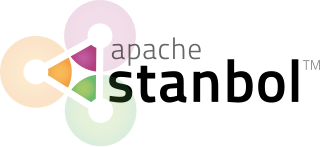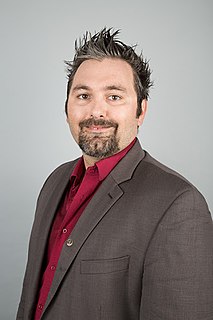Related Research Articles
In computer science and information science, an ontology encompasses a representation, formal naming, and definition of the categories, properties, and relations between the concepts, data, and entities that substantiate one, many, or all domains of discourse. More simply, an ontology is a way of showing the properties of a subject area and how they are related, by defining a set of concepts and categories that represent the subject.
Knowledge management (KM) is the collection of methods relating to creating, sharing, using and managing the knowledge and information of an organization. It refers to a multidisciplinary approach to achieve organisational objectives by making the best use of knowledge.
In software engineering, service-oriented architecture (SOA) is an architectural style that supports service orientation. By consequence, it is as well applied in the field of software design where services are provided to the other components by application components, through a communication protocol over a network. A service is a discrete unit of functionality that can be accessed remotely and acted upon and updated independently, such as retrieving a credit card statement online. SOA is also intended to be independent of vendors, products and technologies.
The World Wide Web has become a major delivery platform for a variety of complex and sophisticated enterprise applications in several domains. In addition to their inherent multifaceted functionality, these Web applications exhibit complex behaviour and place some unique demands on their usability, performance, security, and ability to grow and evolve. However, a vast majority of these applications continue to be developed in an ad hoc way, contributing to problems of usability, maintainability, quality and reliability. While Web development can benefit from established practices from other related disciplines, it has certain distinguishing characteristics that demand special considerations. In recent years, there have been developments towards addressing these considerations.

Catalyst is an open source web application framework written in Perl, that closely follows the model–view–controller (MVC) architecture, and supports a number of experimental web patterns. It is written using Moose, a modern object system for Perl. Its design is heavily inspired by such frameworks as Ruby on Rails, Maypole, and Spring.
Apache Hadoop is a collection of open-source software utilities that facilitates using a network of many computers to solve problems involving massive amounts of data and computation. It provides a software framework for distributed storage and processing of big data using the MapReduce programming model. Hadoop was originally designed for computer clusters built from commodity hardware, which is still the common use. It has since also found use on clusters of higher-end hardware. All the modules in Hadoop are designed with a fundamental assumption that hardware failures are common occurrences and should be automatically handled by the framework.

Apache Taverna is an open source software tool for designing and executing workflows, initially created by the myGrid project under the name Taverna Workbench, now a project under the Apache incubator. Taverna allows users to integrate many different software components, including WSDL SOAP or REST Web services, such as those provided by the National Center for Biotechnology Information, the European Bioinformatics Institute, the DNA Databank of Japan (DDBJ), SoapLab, BioMOBY and EMBOSS. The set of available services is not finite and users can import new service descriptions into the Taverna Workbench.

In computer science, information science and systems engineering, ontology engineering is a field which studies the methods and methodologies for building ontologies, which encompasses a representation, formal naming and definition of the categories, properties and relations between the concepts, data and entities. In a broader sense, this field also includes a knowledge construction of the domain using formal ontology representations such as OWL/RDF. A large-scale representation of abstract concepts such as actions, time, physical objects and beliefs would be an example of ontological engineering. Ontology engineering is one of the areas of applied ontology, and can be seen as an application of philosophical ontology. Core ideas and objectives of ontology engineering are also central in conceptual modeling.
Tom Corby and Gavin Baily (1970) are two London based artists who work collaboratively using public domain data, climate models, satellite imagery and the Internet. Recent work has focused on climate change and its relationship to technology and has involved collaborations with scientists working at the British Antarctic Survey.
Pentaho is business intelligence (BI) software that provides data integration, OLAP services, reporting, information dashboards, data mining and extract, transform, load (ETL) capabilities. Its headquarters are in Orlando, Florida. Pentaho was acquired by Hitachi Data Systems in 2015 and in 2017 became part of Hitachi Vantara.

The Apache Object Oriented Data Technology (OODT) is an open source data management system framework that is managed by the Apache Software Foundation. OODT was originally developed at NASA Jet Propulsion Laboratory to support capturing, processing and sharing of data for NASA's scientific archives.

Akka is a free and open-source toolkit and runtime simplifying the construction of concurrent and distributed applications on the JVM. Akka supports multiple programming models for concurrency, but it emphasizes actor-based concurrency, with inspiration drawn from Erlang.

Apache Stanbol is an open source modular software stack and reusable set of components for semantic content management. Apache Stanbol components are meant to be accessed over RESTful interfaces to provide semantic services for content management. Thus, one application is to extend traditional content management systems with semantic services.
Topincs is a software for rapid development of web databases and web applications. It is based on LAMP and the semantic technology Topic Maps. A Topincs web database makes information accessible through browsing very much like a Wiki. Editing a page on a subject is done through forms rather than markup editing. A web database can be tailored into a web application to provide specific user groups a contextualized approach to the data.

Apache Marmotta is a linked data platform that comprises several components. In its most basic configuration it is a Linked Data server. Marmotta is one of the reference projects early implementing the new Linked Data Platform recommendation that is being developed by W3C.

Chris Mattmann is an American data scientist currently working as the Principal Data Scientist and Chief Technology and Innovation Officer in the Office of the Chief Information Officer (OCIO) at the NASA Jet Propulsion Laboratory (JPL) in Pasadena, California. He is also the manager of JPL's Open Source Applications office. Mattmann was formerly Chief Architect in the Instrument and Data Systems section at the laboratory.

Valerie Belton, commonly known as Val Belton, is a retired professor of management science at University of Strathclyde. She is a researcher who has worked on the design and application of multi-criteria decision making (MCDM) approaches for over 30 years. She co-authored a book on this field Multicriteria Decision Analysis: An Integrated Approach, that was released in 2002. She has attempted to incorporate multi-criteria decision analysis with problem structuring techniques, system dynamics, and other analytical approaches. She has a number of scholarly articles to her name and served as the editor of the journal Multi-Criteria Decision Analysis.
Science gateways provide access to advanced resources for science and engineering researchers, educators, and students. Through streamlined, online, user-friendly interfaces, gateways combine a variety of cyberinfrastructure (CI) components in support of a community-specific set of tools, applications, and data collections.: In general, these specialized, shared resources are integrated as a Web portal, mobile app, or a suite of applications. Through science gateways, broad communities of researchers can access diverse resources which can save both time and money for themselves and their institutions. As listed below, functions and resources offered by science gateways include shared equipment and instruments, computational services, advanced software applications, collaboration capabilities, data repositories, and networks.
Open source is source code that is made freely available for possible modification and redistribution. Products include permission to use the source code, design documents, or content of the product. The open-source model is a decentralized software development model that encourages open collaboration. A main principle of open-source software development is peer production, with products such as source code, blueprints, and documentation freely available to the public. The open-source movement in software began as a response to the limitations of proprietary code. The model is used for projects such as in open-source appropriate technology, and open-source drug discovery.
References
- ↑ Crichton, Daniel J.; Mattmann, Chris A.; Cinquini, Luca; Braverman, Amy; Waliser, Duane; Gunson, Michael; Hart, Andrew F.; Goodale, Cameron E.; Lean, Peter; Kim, Jinwon (September 2012). "Sharing Satellite Observations with the Climate-Modeling Community: Software and Architecture". IEEE Software. 29 (5): 73–81. doi:10.1109/MS.2012.21. S2CID 5652844.
- ↑ Yang, Xiaoyu; Wang, Lizhe; Jie, Wei (2011). Guide to e-Science: Next Generation Scientific Research and Discovery. Springer Science & Business Media. pp. 132–134. ISBN 9780857294395.
- ↑ Wilde, Erik; Pautasso, Cesare (2011). REST: From Research to Practice. Springer Science & Business Media. pp. 238–241. ISBN 9781441983039.